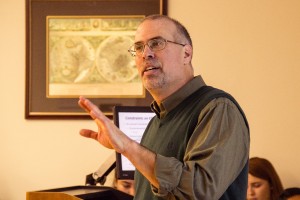Professor discusses local policies on climate change
On Wednesday, students and faculty gathered to discuss the causes, implications and results of global climate change in a seminar called “Adapting to Global Climate Change: The Local Politics of Coping with a Global Problem.” The event was part of the USC Center for International Studies seminar series, which seeks to bring international affairs and research to USC students.

Warming world · Professor Mark A. Boyer speaks to students and faculty about northeastern municipalities’ policy efforts to combat climate change at a seminar at the Social Sciences Building on Wednesday afternoon. – Dasha Kholodenko | Daily Trojan
Mark A. Boyer, a Board of Trustees distinguished professor of political science from the University of Connecticut, hosted the event. The seminar aimed to analyze local and regional policy efforts on climate adaptation. Boyer drew on policy data collected from municipalities in Connecticut and extensive interview data from across the northeastern policy community to show how localities are grappling with this global problem.
During his presentation, Boyer described his research, the motivations behind his work and the outcomes of his discoveries. Boyer began the seminar by giving the example of Hurricane Sandy’s effect on coastal towns in New Jersey in order to prove the importance of appropriate environmental policy and what can happen without it. California and New England are the most progressive areas in the country in terms of environmental policy change, and this makes them both prime to study, Boyer said. Boyer focused his work on 169 Connecticut municipalities, and used methodology that included both data collection and interview testimony.
“Documents, journalistic accounts, other secondary sources only give part of the picture,” Boyer said. “The only way to understand the coordination and efficiency questions is to talk to the people doing work on the ground.”
Boyer emphasized that there are two important elements in his research. The first is mitigation, which is the reduction of potential threats, such as greenhouse gases. The second is adaptation, which is activity that increases the resistance and/or resilience of a system.
In his research, Boyer found that funding is primarily a barrier to creating better mitigation and adaptation policies, as well as climate threat and state policies dictated by the wealthy who own the land. Global climate change policy is slowed and stalled, but Boyer was able to see direct results on a local level.
“From a public goods perspective, the efficient locus of policy change is at the lower level,” Boyer said. “The problem that is the real constraint in the local level is the budget.”
Boyer’s talk is part of a larger effort by USC to promote climate change awareness. Program coordinator Indira Persad said that this issue is important to be aware of.
“The mission of CIS is ‘promote advanced research and critical debate of theoretical and policy issues in world affairs,’ and Boyer’s work on the local politics of climate change does just that,” Persad said. “Issues surrounding the topic of climate change can be controversial because there are no easy solutions. But, the more we talk about these issues and get things out in the open, the closer we are to finding solutions to these problems.”
Many students attended the lecture to enrich their understanding and knowledge of climate change.
“I’m interested in environmental policies and mitigation, so this deals directly with what I want to write for my dissertation,” said Hai-Vu Phan, a Ph.D. candidate in political science and international relations. “I can use Boyer as a resource for when I’m working on my dissertation that examines environmental policies in different countries to find out why they are effective or ineffective, to figure out what will be effective in environmental policies.”
Other students with less knowledge of the topic attended to learn about Boyer’s brand new research.
“Being a freshman here at USC, I am very interested in expanding my knowledge,” said Paige Hines, a freshman majoring in environmental studies. “I like getting a broader and more diverse understanding of current topics involved in my major.”
Boyer said he hopes that there will be a movement of less skepticism toward climate change, and improved efforts to address climate change in the future. Persad believes college-aged students will be key to this movement.
“USC students can best help by educating themselves about climate change, and keeping an open mind when hearing debates or ideas about how to deal with the problems associated with it,” Persad said.
